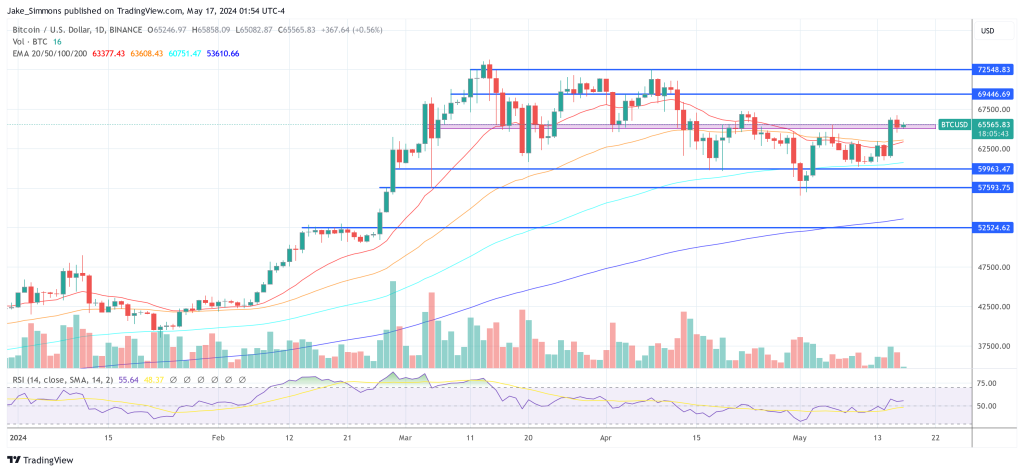Crypto Just Had A Game-Changing Moment, But Will Biden Veto?
In a potentially game-changing moment for the crypto sector, the US Senate has passed H.J. Res 109, a bill seeking to overturn the Securities and Exchange Commission’s (SEC) Staff Accounting Bulletin (SAB) No. 121 om Thursday, May 16. The bill was passed with substantial bipartisan support, receiving a 60-38 vote in the Senate and earlier approval from the House.
SAB 121, implemented in 2022, mandated digital asset custodians to list digital assets as liabilities on their balance sheets, a requirement widely criticized within the crypto community. Critics argue that this regulation unfairly treats customer-owned digital assets as the custodian’s liabilities, thereby necessitating equivalent cash reserves to offset these “liabilities.”
Why Yesterday’s Vote Is A Game-Changer For Crypto
Avichal Garg, Co-Founder and General Partner at Electric Capital, expressed the industry’s frustration, stating, “If a bank custodies $1b of Bitcoin for customers, they have to hold $1b in cash to offset this ‘liability’ on their balance sheet. The assets are not the company’s. They are the customers’.” Garg also suggested that SAB 121 was designed to keep banks out of the crypto markets, which he sees as detrimental to consumer protection.
The Senate’s decision represents a critical juncture not only for crypto regulation but also for political alignments concerning financial technology. Notably, the vote saw 21 Democrats break ranks from their usual stance under the influence of Senator Elizabeth Warren, who has been a stringent advocate for strict financial and tech regulations. This shift suggests a significant political realignment, potentially indicative of a broader centrist move in the Democratic Party concerning market regulations.
Senate Majority Leader Chuck Schumer’s vote in favor of repealing SAB 121 carries considerable weight, signaling strong Congressional support for the cryptocurrency sector against the backdrop of President Biden’s veto threat.
Matt Hougan, Chief Investment Officer at Bitwise, described the moment as transformative for the industry: “This is a game-changing moment for crypto. It’s one of the catalysts that will propel crypto to new all-time highs as the market digests the sea change that’s occurred here.”
Further highlighting the political drama, Perianne Boring, Founder and CEO of The Chamber of Digital Commerce, pointed out the potential influence of Senator Schumer in swaying the President’s decision: “If anyone can convince POTUS to sign, it’s Schumer. We have a very real chance of getting this across the finish line.”
Jake Chervinsky, Chief Legal Officer at Variant Fund, also commented on the implications of the vote, stating, “The Senate just delivered a deafening bipartisan message in favor of common sense and against SEC overreach. It’s impossible to overstate the importance of Majority Leader Schumer voting to repeal SAB 121 over President Biden’s threatened veto.”
What Will President Biden Do?
The resolution now sits on President Biden’s desk, with the President having expressed intentions to veto it, aligning with Senator Warren and SEC Chair Gary Gensler’s views that the SEC’s guidelines are crucial for protecting investors in the volatile crypto markets. Eleanor Terrett of FOX Business highlighted the President’s dilemma, noting, “Biden now has 10 days to either veto, sign or do nothing. Doing nothing would mean it goes into law just without the signature.”
The crypto industry remains on edge as it awaits the President’s decision. A veto would maintain the status quo, potentially stifling further institutional participation in the crypto market due to perceived regulatory risks. Conversely, a decision to sign or allow the bill to pass without a signature could significantly liberalize the regulatory environment, encouraging more substantial institutional engagement and possibly catalyzing a new phase of market growth and innovation.
As the deadline approaches, the decision will not only determine the regulatory framework for digital asset custody but also signal the administration’s broader stance towards innovation and regulation in the fintech sector.
At press time, Bitcoin traded at $65,565.

